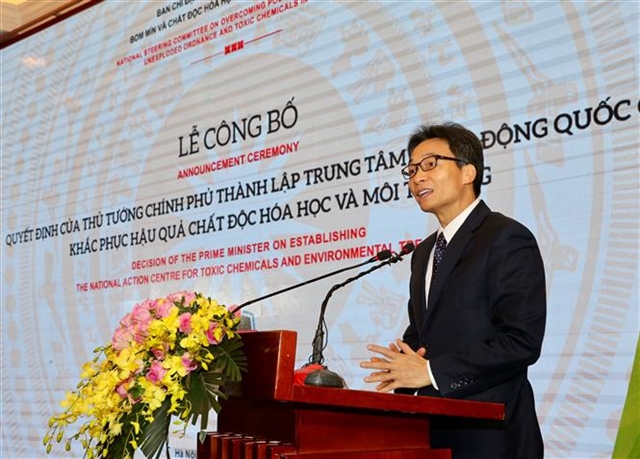 Society
Society


|
| Deputy Prime Minister Vũ Đức Đam speaks at the ceremony. VNA/VNS Photo Dương Giang |
HÀ NỘI — A ceremony to announce the establishment of the National Action Centre for Toxic Chemicals and Environmental Treatment (NACCET) was held yesterday in Hà Nội.
In July, Prime Minister Nguyễn Xuân Phúc signed the decision to establish the NACCET.
The organisation will be responsible for running tasks to overcome the post war consequences of chemical toxins to environment and humans; handling pollution of toxic chemicals and hazardous substances, overcoming incidents of toxic chemicals and environment nationwide; and building and managing a database on overcoming post war consequences of toxic chemicals.
Hà Văn Cử, General Director of the NACCET, said while the war had ended long ago, its consequences remained.
“Tackling post-war toxic chemicals and carrying out activities to ensure security and safety of the environment is an urgent and long-term task. It is both a humanitarian task and a task to ensure the sustainable and prosperous development of the country,” Cử said.
Incidents like the recent mercury pollution and water safety issue in Ha Noi showed the increasing risk of chemical pollution, he said.
“Threats to environmental security have been increasing in terms of scale and seriousness in the past year,” he said.
Speaking at the ceremony, Deputy Prime Minister Vũ Đức Đam emphasised the importance of establishing the NACCET.
“There still remains a huge amount of dioxin-contaminated land in Việt Nam, millions of toxic chemicals in the soil, millions of people who suffered from dioxin contamination after the war. That’s a problem we need to deal with,” Đam said.
He also said that like many in other countries, environmental protection had been neglected for a while.
“The need to address pollution and chemicals detoxification is urgent,” he said, adding that the establishment of the NACCET is timely.
He asked the centre leaders to focus on human resources and technology investment, while also calling on international organisations to support Việt Nam on the issue.
Speaking at the event, Caryn McClelland, deputy chief of mission at the US Embassy in Hà Nội, said the US was committed to supporting the development of Việt Nam.
“Last year, the USAID committed a funding of US$183 million for the initial five years of the dioxin remediation project at Biên Hoà Airport. This is the largest remaining hotspot of dioxin contamination in Việt Nam,” she said.
While it would take Việt Nam and the US 10 years and up to $390 million to clean the Biên Hoà site, McClelland said US commitment was only increasing.
“There have been zero UXO accidents in the last 20 months in the areas where we concentrate our efforts in Quảng Trị Province,” she said.
Over the next five years, USAID has committed more than $65 million to work with the Ministry of Defence, Office 701 and the NACCET to implement the next phase of US’s support for persons with disabilities, according to the official.
The NACCET will also carry out research and technology transfer to help overcome post war consequences of toxic chemicals, handling pollution of toxic chemicals, hazardous substances, and toxic chemical incidents treatment.
It will be responsible for running programmes and working plans on overcoming post war consequences of toxic chemicals, as well as treating toxic chemicals, hazardous substances and overcoming incidents of toxic chemicals.
The Prime Minister assigned the Ministry of National Defence to be responsible for NACCET's activities.--VNS




